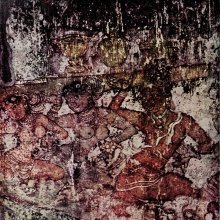Tandu, Taṇḍu, Tamdu: 7 definitions
Introduction:
Tandu means something in Hinduism, Sanskrit. If you want to know the exact meaning, history, etymology or English translation of this term then check out the descriptions on this page. Add your comment or reference to a book if you want to contribute to this summary article.
Images (photo gallery)
In Hinduism
Natyashastra (theatrics and dramaturgy)
Source: Wisdom Library: Nāṭya-śāstraTaṇḍu (तण्डु) is the Sanskrit name of one of Bharata’s sons, mentioned in the Nāṭyaśāstra 1.26-33. After Brahmā created the Nāṭyaveda (nāṭyaśāstra), he ordered Bharata to teach the science to his (one hundred) sons. Bharata thus learned the Nāṭyaveda from Brahmā, and then made his sons study and learn its proper application. After their study, Bharata assigned his sons (eg., Taṇḍu) various roles suitable to them.

Natyashastra (नाट्यशास्त्र, nāṭyaśāstra) refers to both the ancient Indian tradition (shastra) of performing arts, (natya—theatrics, drama, dance, music), as well as the name of a Sanskrit work dealing with these subjects. It also teaches the rules for composing Dramatic plays (nataka), construction and performance of Theater, and Poetic works (kavya).
Languages of India and abroad
Sanskrit dictionary
Source: Cologne Digital Sanskrit Dictionaries: Shabda-Sagara Sanskrit-English DictionaryTaṇḍu (तण्डु).—m.
(-ṇḍuḥ) One of Siva'S doorkeepers, and one of the original teachers of the arts of dancing and mimicry.
Source: Cologne Digital Sanskrit Dictionaries: Monier-Williams Sanskrit-English DictionaryTaṇḍu (तण्डु):—[from taṇḍ] m. Name of an attendant of Śiva (Bharata’s teacher in the art of dancing cf. tāṇḍava).
Source: Cologne Digital Sanskrit Dictionaries: Yates Sanskrit-English DictionaryTaṇḍu (तण्डु):—(ṇḍuḥ) 2. m. Shiva's door-keeper; teacher of mimicry.
[Sanskrit to German]
Sanskrit, also spelled संस्कृतम् (saṃskṛtam), is an ancient language of India commonly seen as the grandmother of the Indo-European language family (even English!). Closely allied with Prakrit and Pali, Sanskrit is more exhaustive in both grammar and terms and has the most extensive collection of literature in the world, greatly surpassing its sister-languages Greek and Latin.
Kannada-English dictionary
Source: Alar: Kannada-English corpusTaṃḍu (ತಂಡು):—[noun] = ತಂಡ [tamda].
--- OR ---
Taṃḍu (ತಂಡು):—
1) [noun] a cane, staff, stick.
2) [noun] a short, heavy club with one end weighted or thicker and heavier than the other, used as a weapon; a bludgeon.
--- OR ---
Taṃḍu (ತಂಡು):—
1) [noun] a man appointed for menial work or is subject to slavery.
2) [noun] a man (as a devotee) who has completely surrendered to another (deity).
--- OR ---
Taṃḍu (ತಂಡು):—[noun] a long-handled, wooden ladle.
--- OR ---
Taṃḍu (ತಂಡು):—[noun] = ತಂಡಿ [tamdi].
Kannada is a Dravidian language (as opposed to the Indo-European language family) mainly spoken in the southwestern region of India.
See also (Relevant definitions)
Starts with (+52): Tamdulajala, Tamdulejjaga, Tamdummumdu, Tamdumumdu, Tamduri, Tamdusaya, Tamduvadisu, Tanduga, Tandujambu, Tanduk zu, Tandul, Tandul-kundra, Tandula, Tandula-parvata, Tandulacurna, Tanduladeva, Tanduladeva kashmira, Tanduladhunirovali, Tanduladona, Tandulagota.
Full-text: Tandava, Tandi, Tripuradaha, Bharata, Nandi, Danda, Tar, Uru.
Relevant text
Search found 10 books and stories containing Tandu, Taṇḍu, Tamdu, Taṃḍu; (plurals include: Tandus, Taṇḍus, Tamdus, Taṃḍus). You can also click to the full overview containing English textual excerpts. Below are direct links for the most relevant articles:
Gati in Theory and Practice (by Dr. Sujatha Mohan)
Analysis of technical terms: Tāṇḍava and Lāsya < [Chapter 1 - Nāṭya]
Literature review—Technical treatises on Nāṭya (Introduction) < [Chapter 1 - Nāṭya]
Technical treatises on Nāṭya (other works) < [Chapter 1 - Nāṭya]
Amarakoshodghatana of Kshirasvamin (study) (by A. Yamuna Devi)
Three types of Dance < [Chapter 4 - Cultural Aspects]
Pallava period (Social and Cultural History) (by S. Krishnamurthy)
Agrapatta or lalatapatta (Forehead band) < [Chapter 4 - Material Culture of the People]
Coiffure of Men < [Chapter 4 - Material Culture of the People]
Shaivism during the Pallava period < [Chapter 3 - Socio-Religious Life]
Natyashastra (English) (by Bharata-muni)
The Bhagavata Purana (by G. V. Tagare)
Chapter 62 - Aniruddha taken captive by Bāṇāsura < [Book 10 - Tenth Skandha]
The Aesthetics of Indian Dance < [January – March, 1985]
Kathakali, and Other Forms of Bharata Natya < [September-October 1933]
